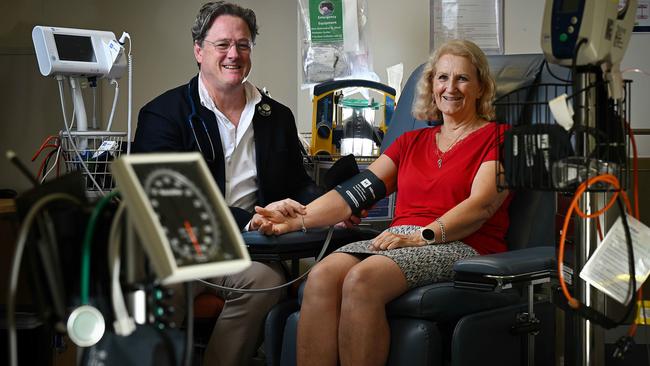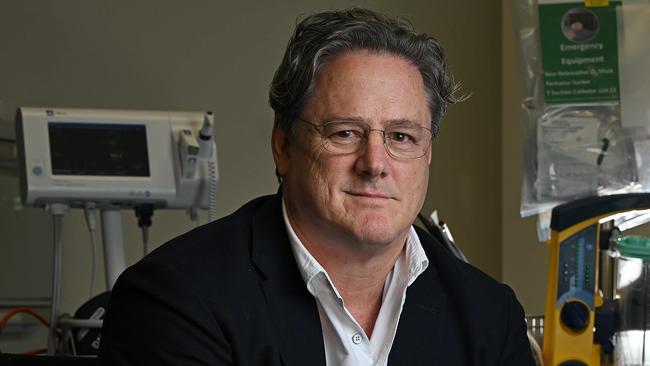The Australian researchers in the race to find coeliac treatment
Coeliac disease is a painful and potentially dangerous health condition for millions of people, but there’s no treatment for it. These researchers hope to one day change that.

When Kay Roper was feeling sluggish and excessively tired and rundown, a coeliac disease diagnosis was the last thing she expected.
The Brisbane woman was fit and healthy and didn’t experience the traditional digestive issues common among sufferers.
Yet, blood tests indicated her body wasn’t absorbing vitamins properly – an indicator of coeliac disease. An endoscopy confirmed her diagnosis.
“That was 17 years ago and it was a bit of a shock because it wasn’t something I was aware of,” Ms Roper said.
Coeliac disease is an immune-based reaction to gluten; a protein found in wheat, barley, and rye. It affects an estimated 1.4 per cent of the world’s population, but there are no proven treatments. Those with the condition are instead advised to adhere to a strict, lifelong, avoidance of gluten. Even then, people with the condition still run the risk of their food being cross-contaminated if a kitchen or food preparation areas are also used to prepare foods with gluten.
“It’s very hard for a restaurant to have two separate preparation areas to cater for hypersensitive coeliacs,” Ms Roper said.
“In the future, you just hope (scientists) find a way to control it or maybe mitigate the reaction, so we don’t have to be so worried.”
Ms Roper said dining out could still be problematic. On one occasion, she recalled her son took her out to a local hotel for dinner but the menu didn’t display any gluten-free options.
“I went up to the counter and I said “excuse me, do you have a gluten-free menu?”, and the guy looked at me and said “You coeliacs are a pain in the arse”, luckily most places are better than that!”
When sufferers eat gluten, they can experience a range of painful symptoms, including digestive issues, fatigue, and weight loss. It also causes intestinal inflammation and can prevent the body from absorbing important nutrients. Left untreated, the condition can lead to serious complications and increase a person’s chance of developing certain cancers.
However, because so many people live with the condition and there is no therapy to treat it, scientists from across the world are in a race to find effective treatments.
Included in that race are Australian researchers at Brisbane’s Wesley Research Institute. They led early, stage-one clinical trials of a drug they hope could one day help to treat the condition.
The novel small-molecule drug, known as IMU-856, targets a protein critical for maintaining gut barrier integrity. In simple terms, the drug is designed to promote gut renewal without suppressing the immune system.

The study’s first author and national co-ordinating investigator, Dr James Daveson, described the therapy as unique.
“It’s first-in-class for this type of disease,” he said.
“There are quite a few novel therapies looking at the different pathogenesis of coeliac disease to try and treat it. But this one is a small molecule working in a new way.”
The study’s findings have now been published in the peer-reviewed journal, The Lancet Gastroenterology & Hepatology. While it is still too early to determine if it will prove successful or become a potential treatment option, initial results are encouraging and suggest the therapy appears safe and should be further investigated.
“The study also showed some improvements in nutrient absorption, so it also showed that zinc and Vitamin B12 levels improved,” Dr Daveson said.
“It also helped reduce symptoms of people with coeliac disease, as opposed to those who received the placebo.”

Dr Daveson said it also appeared to reduce intestinal damage in patients who did consume gluten. The drug was developed by the US-based company, Immunic, which also funded the study.
While the study was too small for it to be considered statistically significant, researchers anticipate the drug could soon move to stage-two trials.
If proven to be effective in larger trials, Dr Daveson hopes therapies like this one could one day offer relief to the millions of people who experience a range of gastrointestinal diseases.
“Improving the gut integrity should reduce the morbidity and complications that go along with GI diseases, such as osteoporosis or iron depletion, malnutrition,” he said.
“Long-term, if you don’t have evidence of active inflammation, your risk of those more sinister complications reduces as well.”
—





To join the conversation, please log in. Don't have an account? Register
Join the conversation, you are commenting as Logout